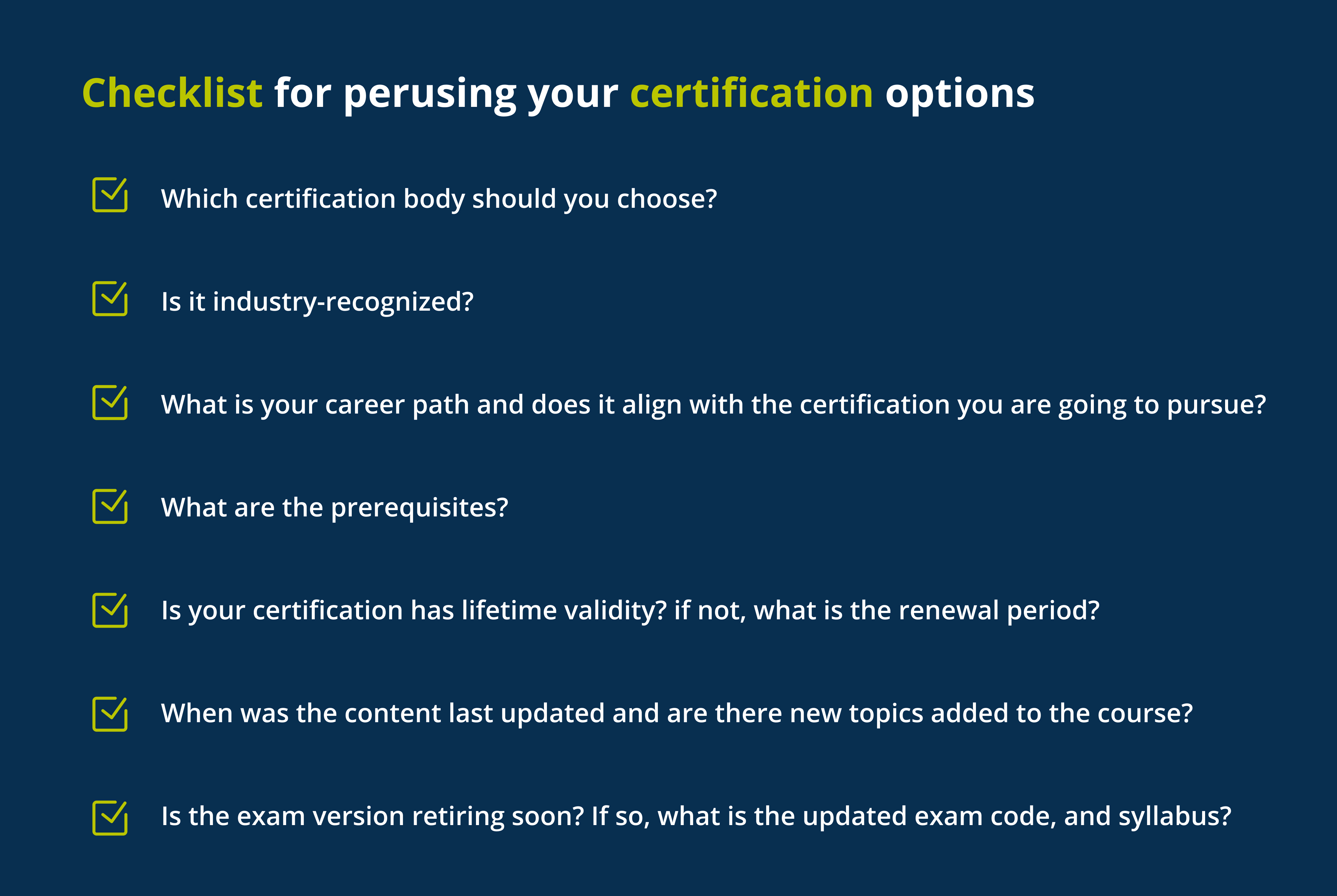Successful professionals constantly push themselves to learn more, pay heed to professional meetings regularly to network with peers and mentors and seek out challenges.
Earning a certificate or professional certification in respective fields offers immense expertise and advances your knowledge for huge career opportunities. If you’re considering pursuing an industry certificate, you should be clear about why you want to do so.
What you'll find in this article [hide]
The value of certification & training
A certificate program based on assessment is meant to help participants gain specific expertise and awards a certificate to acknowledge mastery of the course objectives. It is aimed to certify participants’ capability after ensuring that they have satisfied predefined requirements. To honor their achievement, the participants are awarded a professional designation.
According to Pearson VUE’s latest Value of IT Certification report, 73% of candidates out of 29,000 candidates pursued IT certification to enhance job performance, and 86% are likely to recertify in the next 12 months. That’s certainly a lot of competition within the industry! There tends to be a consensus that the more certifications the better.
So, what benefits do certifications bring to the table for individuals and organizations?
It’s simple—the increased value is significant.
Organizations that promote staff certification programs report that their employees become more productive, proficient, satisfied, and dedicated. Employees were less likely to seek new possibilities outside of the company when employers covered the costs of certification (74 percent versus 87 percent), resulting in higher employee retention. The value of certification holds great importance for an individual as well. A certified individual has a better scope to advance their career. Being certified also helps the individual to expand their skillset and gain the necessary knowledge, and expertise to build a solid foundation and earn the respect of peers and colleagues. Learn more about the essential skills you need to have in 2024 in our blog here.
Path to acquiring a certification
The first step was understanding the value a certification brings. Now, it’s time to choose one. Before pursuing a certification course, consider these points to avoid rushing and getting your money and time wasted.
1. What is your motive?
Is earning money your ultimate goal? Is it for professional advancement? Perhaps you just want to pick up a new skill? You shouldn’t begin weighing your options until you have a firm response. If you’re going to enhance your career, you’ll need to work on your technical abilities, especially with all significant IT breakthroughs in domains like cloud computing, security, and networking. To advance into new career roles, advanced qualifications are frequently required. Make sure your decisions are in line with your career goals.
2. What are your interests?
There are several certification bodies that can validate your skillset and provide compliance certificates. For example, if you want to pursue cloud certifications, then you can opt for CompTIA, Microsoft Azure, and Amazon AWS. ISACA and ISC2 are leading in the data privacy and security domains, respectively. The Agile and DevOps methodologies have proved beneficial for many teams as they try to become nimblers during these times of frequent change during the pandemic. If you are considering such a credential, you can consider acquiring certifications from bodies like ScrumStudy and DevOps Institute. On the other hand, PeopleCert is one of the most popular certification bodies that validate candidates’ skills in various domains starting from IT Governance & Service Management to cyber security.
Take as many certifications as you can in a specific skill set if you’re extremely passionate about it. Remember, certification is more meaningful if the subject is one that your organization has been considering implementing or if you are planning for a spike on your career graph; therefore, it is important to analyze your interests and requirements. For example, CompTIA Cloud Essentials + teaches beginners about the skills required to make clear and conscious decisions about cloud technologies and their business impact. Those who wish to gain authority over cybersecurity can consider CISSP certification, which is practically equivalent to a master’s degree in information security. On the other hand, ITIL® is a professionally recognized certification scheme that supports organizations and individuals to gain optimal value from IT and digital services.
Being well-versed in numerous technologies is always a good option!
3. Start your research
There are many differences between certificates for different topics and businesses. Make sure you do sufficient research and understand what’s expected from you. Consider interacting with coworkers and reading articles about IT to identify the appropriate certification. Before pursuing a certification, make sure you make sure to keep the following questions in mind:

Answering these questions will give you a concise idea and then you can start with the desired certification course.
For example, APEX Global Learning offers 25+ role-based certifications that boost your flexibility not just in your current role but also in your field. From Agile, DevOps, and IT Services to cloud, data centers, IT infrastructure, security, and business continuity, APEX Global provides a range of highly lucrative specializations with its globally recognized partners.
Wrapping up
Certification has a straightforward concept, it demonstrates your potential to colleagues and seniors. It’s more difficult to pinpoint your starting point. You’re on the right track if you can narrow down your preferences to a specific tech trend or job role.
Organizations can use certifications to demonstrate their priority to personnel career growth and productivity. Businesses with certified employees have an advantage over their competitors. Additionally, organizations that invest extensively in employee certification can mitigate potential hazards, grow their network, and observe larger returns. Nearly 95% of IT managers agree that certifications can offer value to a company.
Further, certificates aid in rapidly assessing skill levels, saving time and resources throughout the recruitment process. Another significant benefit of certification for firms is the regularity with which given duties are completed – certified specialists improve the consistency with which organizational processes are carried out!
Thinking of pursuing a certification? Confused where to start? Facing difficulties in finding the right resources for you or your employees?
We at APEX Global are dedicated to helping individuals gain professional expertise and knowledge. Check out our corporate certifications that align with your career path and expand your knowledge and skillset so you can stand out in the crowd.


